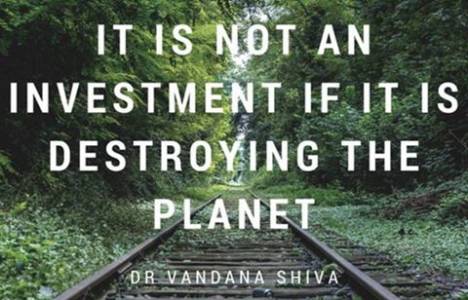By Max Link

Image: Pixabay
Imagine you are an investor who seeks financial returns from your investments, but you also care about the environment. Maybe you wear Patagonia as you drive a hybrid car to Whole Foods, where you shop exclusively with your farmer’s market reusable bag. You are a conscious capitalist; you don’t want to fund the climate crisis through your investment and don’t want a dirty portfolio to hang on your consciousness.
Environmental, Social, and Governance, or ESG
Meet Environmental, Social, and Governance, or ESG. This refers generally to financial practices that incorporate your values but still promise the same (or better!) returns. For many investors, this manifests itself in the form of choosing where to put your money based on corporate performance on environmental, social, and governance issues. For example, you would be more likely to invest in SunPower than ExxonMobil. Investors use ESG metrics, or scores assigned to companies, to make decisions about where money should flow. Simply put, socially-minded investors (and there are a growing number of them!) direct capital into companies with top ESG scores.
The practice was popularized only in the last four years by Larry Fink, CEO of BlackRock, the world’s largest asset management firm. In the 2018 edition of his annual letter to the CEOs of the world’s largest corporations, he urged companies to consider social values in their work. Since then, he has overseen the growth of ESG investing to the number of $46 trillion dollars in 2021, with a projected increase to $80 trillion in 2024.
Sounds like a win-win, right? Over time, as more investors and money follow ESG strategy, capital directed toward responsible companies should burgeon, while capital available to “bad” companies should dry up, dropping their share prices and making them an even more unattractive investment. In short, the market should provide a perfect, clean solution to many social ills. It seems to be an efficient solution where the economy evolves toward green enterprises, investors see profits, and the world becomes sustainable.
Unfortunately, ESG has turned out to be an incredibly effective and phenomenally profitable lie cooked up by Wall Street. The primary problems with ESG as it currently stands are that the metrics are nonsense enough to be labeled illegitimate and the idea of ESG is a dangerous distraction from real climate action.
Environmental, Social, and Governance (ESG) Ratings
 ESG ratings come from a variety of different agencies such as Morgan Stanley Capital International (MSCI) ESG Ratings, Bloomberg ESG Disclosures, Moody’s ESG Solutions Group, and S&P Global ESG. A score can range from CCC (the worst) to AAA (the best). The problem here is that there are massive inconsistencies across rating agencies, which allows companies to game their rating, choosing between agencies to achieve the best possible score. They then advertise their good score to attract capital from ESG-minded investors. The discrepancy ends up working so well for companies that there is no incentive to standardize rating criteria. In June 2021, the Wall Street Journal conducted a study on the correlation between three top ESG agencies, the London Stock Exchange Group’s Refinitiv, MSCI, and Sustainalytics, a division of Morningstar Inc. They found alarming discrepancies in the financial performance of each tier of ratings from the three agencies, meaning there was little correlation among scores. A company can use an ESG score to support its sustainability claims, even if that score has a shaky basis.
ESG ratings come from a variety of different agencies such as Morgan Stanley Capital International (MSCI) ESG Ratings, Bloomberg ESG Disclosures, Moody’s ESG Solutions Group, and S&P Global ESG. A score can range from CCC (the worst) to AAA (the best). The problem here is that there are massive inconsistencies across rating agencies, which allows companies to game their rating, choosing between agencies to achieve the best possible score. They then advertise their good score to attract capital from ESG-minded investors. The discrepancy ends up working so well for companies that there is no incentive to standardize rating criteria. In June 2021, the Wall Street Journal conducted a study on the correlation between three top ESG agencies, the London Stock Exchange Group’s Refinitiv, MSCI, and Sustainalytics, a division of Morningstar Inc. They found alarming discrepancies in the financial performance of each tier of ratings from the three agencies, meaning there was little correlation among scores. A company can use an ESG score to support its sustainability claims, even if that score has a shaky basis.
Earlier this summer, under the same reasoning, the Securities and Exchange Commission launched an investigation into Goldman Sachs’ ESG arm on suspicion of misleading investors on their funds’ social impact. Among other actions, Goldman’s “Blue Chip Fund” was renamed the “US Equity ESG Fund,” without any significant changes to the portfolio. Similarly, DWS, an asset manager in whom Deutsche Bank owns an 80% stake, is being investigated by regulators in Germany after a former sustainable finance manager blew the whistle about greenwashing. Police officers raided the Frankfurt office and the investigation discovered “evidence that could support allegations of fraud.” The chief of DWS, Asoka Wöhrmann, then resigned over the allegations and controversy. Financial institutions found a way to easily game the system and advertise funds built on fraudulent ESG ratings.
Socially-minded people believe that they are taking action when they divert their funds from a low-rated fund into a high-rated fund. This is not the case.
Now that it’s been established how ESG ratings don’t confer much meaning, it is important to discuss what they do accomplish. Socially-minded people believe that they are taking action when they divert their funds from a low-rated fund into a high-rated fund. This is not the case. First, oftentimes when an entity (individual, university, pension fund) divests from, say, ExxonMobil, they expect that to directly harm the company, and thus in some way depress the global fossil fuel industry (even though the top three oil companies are state-owned enterprises of China and Saudi Arabia). This seems to be intuitive at first: you pull your money out of ExxonMobil, they have less capital to expand, and thus face a repercussion for producing oil. However, to sell one’s shares in ExxonMobil, someone else needs to buy them. Once bought, partial ownership in the company is transferred to some entity that is even less accountable. On ExxonMobil’s end, nothing changes. Diverting capital to ESG funds is mostly just useful in the sense that it stigmatizes, or publicly signals disapproval, of a company’s actions.
Does ESG Lead to True Action?
The danger comes when people believe that true action is being taken in the world of ESG. Tariq Fancy, former Chief Investment Officer of Sustainable Investing at BlackRock, left the ESG industry because he realized its illegitimacy and danger. Along with Ryerson University, Fancy conducted a study of 3,000 Americans, giving them climate finance-related headlines. Among the headlines were stories about Larry Fink’s 2018 letter and warnings about the climate-related risk to portfolios. In the study, people mistakenly believed that all of the headlines described significant impacts. It is likely that people confuse “climate-related risk” with the harm inflicted on the world, rather than just a threat to returns on portfolios. Further, the study found that, after reading the headlines, Americans were 17% more likely to place their faith in business to lead a sustainable future. This is a dangerous belief, especially considering that in a profit-maximizing, shareholder capitalist economy, businesses are not looking out for most people. Basic economics dictates that offloading externalities, such as dumping pollution into a river rather than paying to clean it up, is much more profitable to corporations than green practices. Financial institutions and large corporations will do what they must to turn a profit, and that does not include cute sustainable commitments. It makes very little sense to say that the same economy that created the climate crisis can also lift us out of it using identical shareholder logic.
 ESG becomes even more profitable for financial institutions as they charge higher fees for investing in ESG funds. Banks charge a “greenium” for managing money in ESG funds, providing a boon to the industry without any noticeable change in investment practice. Indeed, a Bloomberg study found a 0.9974 correlation between the Vanguard ESG Fund (totaling $741 million in assets) and the S&P 500, which tracks the top-performing businesses and does not take ESG scores into account. The two funds are nearly identical, yet the Vanguard ESG charges a fee many times higher than the S&P 500. In this way, financial institutions see a huge profit from increased interest in ESG. They have every incentive to peddle ESG as a way to change the world while using it to prevent any change at all by placating people.
ESG becomes even more profitable for financial institutions as they charge higher fees for investing in ESG funds. Banks charge a “greenium” for managing money in ESG funds, providing a boon to the industry without any noticeable change in investment practice. Indeed, a Bloomberg study found a 0.9974 correlation between the Vanguard ESG Fund (totaling $741 million in assets) and the S&P 500, which tracks the top-performing businesses and does not take ESG scores into account. The two funds are nearly identical, yet the Vanguard ESG charges a fee many times higher than the S&P 500. In this way, financial institutions see a huge profit from increased interest in ESG. They have every incentive to peddle ESG as a way to change the world while using it to prevent any change at all by placating people.
In order to produce tangible change, we need to shift our focus away from ESG. It is a dangerous but genius lie born by Wall Street to distract people from real reform. It will require a revolution in our economy, society, and daily lives to create a sustainable future. The world in which Wall Street reaps obscene amounts of money is diametrically opposed to a sustainable future. The climate-conscious citizen must be wary of any scheme supported by Wall Street that simultaneously rakes in record profits for banks. Although a change in the world of finance is without a doubt necessary, it will not come from ESG as it currently stands.
To learn more about this issue, I suggest reading through Tariq Fancy’s four-part “The Secret Diary of a ‘Sustainable’ Investor.” He provides a much more comprehensive account of ESG and brings an unmatched insider perspective.
How Can You Take Action?
Want to get more involved? Join the Defund Climate Disaster/Divest-Invest Committee to receive ongoing action alerts and stay up to date with campaign planning.
- Break ties with and boycott banks financing harmful projects. Select a financial institution that is not financing fossil fuel projects and infrastructure, such as tar sands oil, fracking, coal mining, and oil or natural gas pipelines. Credit Unions are a great place to start.
- Support Public Banking! 350 Colorado, as part of the Colorado Public Banking Coalition, is continuing to call on Colorado Legislators to support legislation to establish a Colorado public bank and allow municipal governments to establish public banks. Sign on to our support letter here!
- Cut ties with insurers that insure or invest in fossil fuels. Call on your city or county to do so as well. Check out this Toolkit and learn more here.
